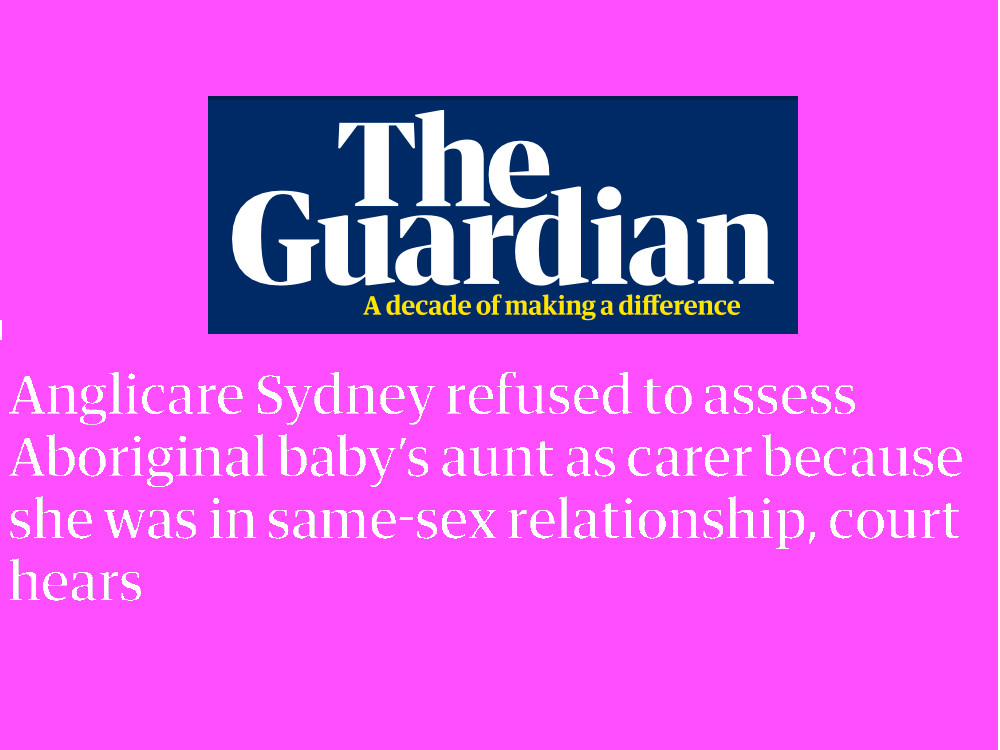The case of “Daisy”, a pseudonym for a nine-month-old girl at the centre of a NSW Children’s Court case reported by The Guardian, puts a spotlight on the place Anglicare Sydney and other Christian agencies have in the welfare system.
Daisy, an Aboriginal child with complex needs, had been placed through the Anglicare adoption “non-Indigenous couple as ‘authorised pre-adoptive carers’, court documents show,” The Guardian reports.
“The court heard Daisy’s mother, known by the pseudonym Paula, who struggled with addiction and an acquired brain injury, and experienced unstable housing and domestic violence, had entered a voluntary agreement with Anglicare Sydney.”
“Daisy was diagnosed with neonatal abstinence syndrome after being exposed to illicit substances in utero and spent several weeks in hospital, where doctors found she has “atypical neurological function”, according to court documents. She is being assessed for cerebral palsy.
“The children’s court magistrate Tracy Sheedy said in a decision in December that there was “no doubt” the child’s foster parents, known by pseudonyms Greta and Peter, have ‘done a wonderful job of looking after Daisy’, but was ‘alarmed’ and ‘disturbed’”’ by the conduct of Anglicare Sydney and the NSW Department of Communities and Justice (DCJ) in her case.”
Sheedy’s concern revolved around a failure to assess another possible carer after Daisy’s mother “Paula” had suggested a cousin. An Aunt was another possibility. But in October DCJ put forward a case plan for adoption citing Daisy’s significant health needs.
The Guardian’s story focussed on Anglicare not assessing the Aunt because she is in a same-sex partnership.
If Daisy missed out of being placed with an Aboriginal carer because of Anglicare’s policies, the Aboriginal Placement Principle – a legal requirement – has not been met, and an injustice has been done.
The Other Cheek understands that Anglicare is not part of the court case. It is unusual for a Children;’s court case to be reported – it is not an open court so some of the factors in the case are unknown. For example the nature of the voluntary agreement with Anglicare – not a common procedure, and whether DCJ, which is part of the proceeding, had reasons not to assess the cousin or the aunt.
Anglicare told The Other Cheek, “Anglicare Sydney is a Christian Not-For Profit that serves in accordance with the doctrines of the Anglican Diocese of Sydney, which believe the best interests of a child are best served by giving access to both mothering and fathering, wherever possible.
“In cases where Anglicare Sydney does not undertake an assessment of a potential carer for this or any other reason, we consult with the NSW Department of Communities & Justice (DCJ) with DCJ either conducting the assessment themselves, conducted via independent assessment or referred to another Foster Care provider.
“As an accredited Foster Care provider, Anglicare Sydney remains committed to Aboriginal & Torres Strait Islander Child & Young Person Placement Principles.”
In Daisy’s case, Anglicare and DCJ should have ensured that the aunt and cousin were assessed. Where LGBTQIA persons are involved Anglicare can and should recuse itself. As the Anglicare statement suggests, DCJ, another agency or an independent consultant could be used.
Carefully reading the Anglicare statement suggests that is what the agency does – at least in theory –where LGBTQIA carers are being assessed. The Other Cheek does not know if exactly the same statement was given to The Guardian, but if it was it was not fully reported – the part about using other agencies or consultants is not in their story.
That part of the Anglicare response is significant. To take a parallel issue- conscientious objection by medical personnel to abortion in NSW avoids standing in the way of patients making a different choice, by making sure that information on other probers of medical care has to be available. In the same way, Anglicare can provide a pathway for LGBTQIA carers to be involved, by having other providers get involved.
A caveat is that there may have been some “triage” of potential carers involved in Daisy’s case. Possible reasons why the cousin and aunt were not assessed are not covered in The Guardian’s report. There may be threshold requirements such as police checks. The Other Cheek does not suggest Police checks were involved, we have limited information. A full report in Children’s Law News the source where significant cases are reported might have included these details.
Without Lesbians and Christians the foster care system would collapse. Both a represented well above their proportion off the population.
Both groups are important. that is why diversity of welfare agencies can help. A Christian agency like Anglicare can bring in one of these groups, and other agencies can bring in others. One area of need is for an Aboriginal and Islander agency or agencies to bring in more First Nation’s carers. It may have been that greater support for Paul’a’s cousin and aunt may have given greater options for DCJ in Paula’s case.

